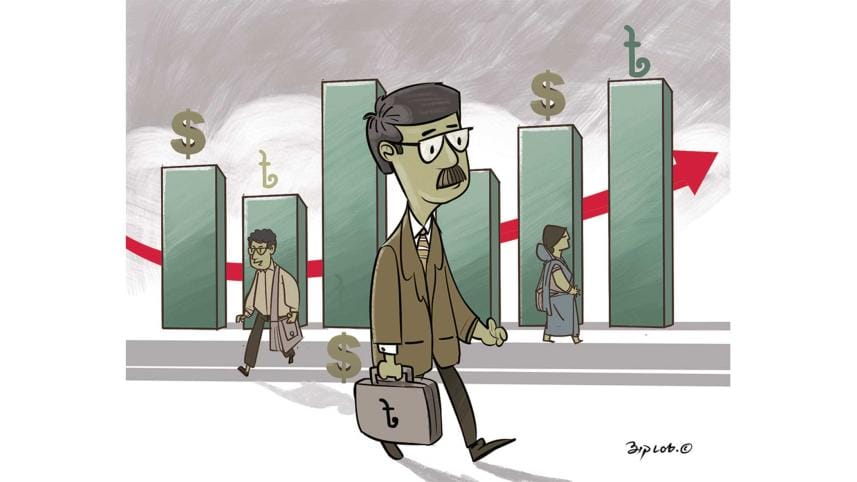The flip side of economic growth

With the rising prices of essentials in Bangladesh, people with fixed income are struggling to make ends meet. But some of the ministers are in denial, sometimes referring to the increasing income levels of the people in the country as the cause behind the increased living costs. This argument seems logical if we note that our per capita income increased by 11 percent in the 2020-2021 fiscal year and now stands at USD 2,591. Additionally, we achieved 6.9 percent growth in GDP. Furthermore, by 2041, the government expects the country's economic volume to grow to USD 2.5 trillion and the per capita income to cross USD 12,000. There is a flip side to it: The benefits of economic growth have mostly trickled up, rather than trickle down. The World Inequality Report 2022 revealed that only one percent of Bangladesh's population held 16.3 percent of the total national income in 2021, and the bottom half held 17.1 percent. And overall, 44 percent of our total national income is acquired by only 10 percent of the population.
We find misery within rampant economic growth, but policymakers globally show persistent fascination towards growth. The obsession with economic growth echoes John Maynard Keynes's speculation in the 1930 essay titled "Economic Possibilities for Our Grandchildren," which says capital investment and technological progress would create a society where people would not have to work more than 15 hours a week. However, the global situation is far from what Keynes predicted 92 years ago. Government policies are focused too narrowly on the growth trajectory, ignoring many other ominous signs: rising inequality, corruption, soaring inflation, youth unemployment, regional disparity, etc. Considering the paradox, one could ask: If the economy is growing, why are people suffering? A straightforward answer to this: economic growth, as measured by GDP, does not essentially lead to common well-being.
Since the Bretton Woods conference in 1944, economic growth in GDP has dictated how countries conduct their affairs and priorities worldwide. Economic growth often means more people at work and more businesses in operation. Moreover, economic growth is expected to provide people with opportunities to move up the ladder and perform to their full potential. The height of this tendency was revealed by Irish Prime Minister Bertie Ahern in 2006, when he explained the rising inflation saying, "The boom times are getting even boomier." Similarly, some Bangladeshi ministers associate the rising living costs in the country with the increasing purchasing power of the population, and focus more on economic growth.
One could say that the world leaders are obsessed with economic growth measured by the GDP. However, there is no consideration of whether that growth is "good for all." For example, due to the traffic congestion, we lose a portion of our workday and efficiency. We could calculate the loss it incurs to the overall economic growth. But ironically, traffic congestion also causes GDP to increase, since people must buy all that gasoline. Additionally, traffic congestion's aggregate negative consequences are not directly visible, as pollution and frustration do not usually show up in data representing economic growth. Many economists would agree that economic growth as measured by GDP is not directly connected with social and environmental outcomes that determine our well-being and the planet's sustainability.
To move away from the world's growth model and reliance on GDP as the measure of development is challenging. It would practically mean that we significantly reduce buying products. As the demand for commodities is reduced, production will decrease, and natural resource extraction will be slowed. Eventually, our planet's sustainability will improve. But the growth supporters fear that in such an economy, many people would find no work. Nonetheless, they ignore that if we could decouple income from labour by introducing a basic income for all, it would encourage people to become entrepreneurs and try alternative livelihood options. The government could raise taxes on the rich to finance a basic income scheme. Furthermore, if growth becomes less imperative, policymakers could prioritise distributional policies more than we have today by providing better education, healthcare, or job opportunities for the disadvantaged segment, without worrying about increased government spending.
One could argue that we still do not have globally applicable financial, political, and social redesign models to build an economy that will thrive even if it does not grow. But it is an existential question, and we need to start raising our voice at mainstream policy debates.
Mohammad Tareq Hasan, PhD, is an anthropologist and teaches at Dhaka University.



 For all latest news, follow The Daily Star's Google News channel.
For all latest news, follow The Daily Star's Google News channel.
Comments